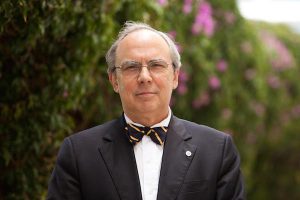Sept. 17, 2017: João Carlos Espada discusses impact of American Revolution on modern democracies in Constitution Day lecture
by Michelle Saport |
 Join guest lecturer João Carlos Espada for the 13th annual Constitution Day Lecture:
Join guest lecturer João Carlos Espada for the 13th annual Constitution Day Lecture:
"The American Constitution and the Tradition of Liberty Among the English-Speaking Peoples: A View from Europe" Sunday, Sept. 17, 7:30-9:30 p.m. Lewis E. Haines Meeting Room - UAA/APU Consortium Library, Room 307
In many countries on the European continent, it is still common to say, and to teach, that the origins of modern democracy were in the French Revolution in 1789. This obvious chronological mistake overlooks the American Revolution in 1776 and the American Constitution in 1788-89, not to mention England's Glorious Revolution in 1688. The concept of democracy that emerged from the American Revolution was significantly different from the one that emerged from the French Revolution. At the core of this difference lies the concept of limited government, which was crucial to the American Revolution but almost absent in the French one. Professor Espada will argue that modern liberal democracies, when and where they have been successful and lasting, owe much more to the ideas of the English and American Revolutions than to those of the French Revolution.Professor João Carlos Espada teaches political science at the Catholic University of Portugal, where he is founder and director of the Institute of Political Studies. He earned his Ph.D. from the University of Oxford and has taught at Brown, Stanford and Georgetown Universities in the United States, and at the College of Europe in Warsaw. In his youth he and his wife were active in the revolution that established democracy in Portugal, and later he served as a political advisor to Presidents Mário Soares (1986-90) and Cavaco Silva (2006-11). His most recent book in English is The Anglo-American Tradition of Liberty: A View from Europe (New York: Routledge, 2016). This is his first visit to Alaska.
Parking is free on Sunday in all UAA parking garages and surface lots, including the lot north of the new north entrance to the library, which affords the most convenient access to the Lewis E. Haines Meeting Room.
Those who wish to learn more about professor Espada's scholarship in advance of the lecture are directed specifically to his book The Anglo-American Tradition of Liberty: A View from Europe, which has chapters on Edmund Burke, Alexis de Tocqueville, Winston Churchill, Karl Popper, Leo Strauss, Irving Kristol and Gertrude Himmelfarb, among others. If you would like to have a copy, you may order it in advance (ISBN 978-1-4724-5572-7). He will be happy to inscribe copies of the book after his Constitution Day Lecture.
The Chartwell Lecture Series, organized by the UAA Department of Political Science, features lectures on a wide range of subjects in the humanities and liberal arts. Lectures are free and open to members of the general public. Professor Espada's lecture is made possible by a grant from the Polaris Lecture Fund in the University Honors College and co-sponsored by the Alaska Association of Scholars.
 "Sept. 17, 2017: João Carlos Espada discusses impact of American Revolution on modern
democracies in Constitution Day lecture" is licensed under a Creative Commons Attribution-NonCommercial 4.0 International License.
"Sept. 17, 2017: João Carlos Espada discusses impact of American Revolution on modern
democracies in Constitution Day lecture" is licensed under a Creative Commons Attribution-NonCommercial 4.0 International License.









